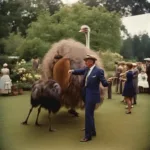Have you ever wondered what the magnificent creatures of the wild, known as wolves, do to pass the time when they’re not on the hunt or patrolling their territories? Wolves, with their fierce yet graceful demeanor, have captivated and intrigued humans for centuries. In this article, we will delve into the fascinating world of wolves, shedding light on their playful tendencies and exploring the activities that bring them sheer joy. Prepare to uncover the captivating secrets of what wolves do for fun, as we take a friendly and informative journey into their leisurely pursuits.
Table of Contents
- 1. The Playful Side of Wolves: Unmasking Surprising Fun Facts!
- 2. Wolf’s Game Time: Intricate Social Bonding Through Playfulness
- 3. Howling with Joy: Wolves’ Favorite Playtime Activities Revealed
- 4. Beyond the Pack: Wolves’ Fascinating Solo Play Adventures
- Q&A
- To Conclude

1. The Playful Side of Wolves: Unmasking Surprising Fun Facts!
When we think of wolves, the majestic creatures of the wild, we often imagine them as fierce predators roaming the forests. However, wolves have a playful side that may surprise you! Let’s dive into some fun facts about these fascinating animals:
- Wolves love to play games: Similar to domestic dogs, wolves enjoy engaging in playful activities. They indulge in friendly wrestling matches, chase each other through the forest, and even play a game of “tug-of-war” with sticks or bones. This playful behavior helps them strengthen social bonds and develop their hunting skills.
- They have a keen sense of humor: Believe it or not, wolves have been observed playing practical jokes! They may sneak behind a sleeping pack member and gently nip their tail or paw, causing a moment of surprise. This behavior not only demonstrates their intelligence but also fosters a sense of camaraderie within the pack.
Who could have imagined that these wild canines could have such a playful nature? By allowing us to glimpse their lighter side, wolves remind us that even the fiercest creatures have a sense of fun. So, the next time you encounter a wolf, remember that they are not only powerful and majestic but also enjoy a good game or two!

2. Wolf’s Game Time: Intricate Social Bonding Through Playfulness
In the world of wolves, playtime has a special purpose beyond mere entertainment. Play serves as the primary vehicle for developing intricate social bonds within wolf packs. It is a time for fostering relationships, establishing hierarchies, and reinforcing cooperation among pack members. Through playfulness, wolves learn essential skills, such as hunting tactics, communication, and problem-solving, all while building trust and empathy among one another.
Wolf play is a diverse and dynamic activity, encompassing a wide range of behaviors that can be observed within a pack. Chase games, wrestling matches, and friendly sparring are common forms of play that promote physical coordination and strength. Additionally, mock fights and play bites teach wolves vital combat strategies and help establish dominance and submission within the pack.
- Promoting social cohesion: Play encourages teamwork, allowing pack members to develop a deep understanding of one another’s strengths and weaknesses, fostering a tightly knit social unit.
- Building trust: Through playful interactions, wolves build trust and form strong emotional bonds, enabling them to rely on one another during a hunt or other challenging situations.
Play also serves as an opportunity for young wolves to learn from their experienced counterparts. Pups engage in various playful activities, mimicking adult behaviors to acquire vital life skills. Through these games, they refine their hunting techniques, learn to communicate effectively, and gain a deeper understanding of their pack’s social dynamics. Ultimately, game time for wolves is more than just fun – it is the foundation upon which their tightly woven social fabric is built.

3. Howling with Joy: Wolves’ Favorite Playtime Activities Revealed
Wolves are magnificent creatures that embody strength, intelligence, and a sense of adventure. When it comes to playtime, they exhibit an incredible array of activities that showcase their natural instincts and social behavior. Let’s venture into the world of these fascinating canines and explore some of their favorite playtime pastimes!
1. Chase and Catch: Much like your household dog, wolves absolutely love a good game of chase. They engage in friendly pursuit, sprinting across the open landscape, dodging trees, and eagerly trying to catch their pack mates. This activity not only hones their coordination and speed but also serves as an excellent team-building exercise, reinforcing their cooperative skills.
2. Tug of War: Wolves have mighty jaws, specifically designed for hunting and gripping prey. It’s no wonder that they adore a spirited game of tug of war. Whether it’s with branches, rope, or even each other, these playful canines engage in friendly battles of strength. This exhilarating game helps them foster strong bonds within the pack while simultaneously sharpening their jaw muscles.

4. Beyond the Pack: Wolves’ Fascinating Solo Play Adventures
When we think of wolves, the image of a majestic pack hunting together often comes to mind. However, these incredible creatures also have fascinating solo play adventures that showcase their individuality and intelligence. Let’s explore some of the extraordinary ways wolves engage in independent play, beyond their collaborative pack dynamics.
1. **Chasing Their Tails:** Just like our playful canine companions, wolves can often be seen spinning in circles, attempting to catch their own tails. This adorable behavior serves multiple purposes, including exercise, mental stimulation, and even self-grooming, as it helps them reach those hard-to-reach areas.
2. **Object Manipulation:** Wolves possess an innate curiosity, and this is frequently demonstrated through object manipulation. They can be found tossing, rolling, and pouncing on various objects in their environment, such as branches, rocks, or even their own toys. This playful behavior allows them to explore their surroundings, learn new skills, and keep themselves entertained.
Concluding Remarks
In conclusion, wolves are more than just fierce predators roaming the wilderness; they also know a thing or two about having fun! From their joyful howling sessions to their playful games of chase, wolves engage in a variety of activities that bring happiness and build stronger bonds within their pack.
Their sophisticated social structure ensures that everyone gets a chance to participate in the fun, fostering a sense of unity and cooperation. Whether it’s teaching their young ones essential life skills through games or simply enjoying a good romp, wolves understand the importance of playtime in their lives.
By observing these fascinating creatures, we gain insight into the extraordinary and often misunderstood world of wolves. Appreciating their innate ability to strike a balance between work and play, we realize that even in the animal kingdom, recreation is an integral part of a healthy and fulfilling life.
So, next time you find yourself marveling at these magnificent creatures, remember that in addition to being skilled hunters and guardians of their territories, wolves are not afraid to let loose and have some fun. Embrace their spirit of adventure, cherish the joy they find in their activities, and celebrate the profound impact playfulness has on their existence. After all, we could all use a little more “wolfish” enjoyment in our lives!
















